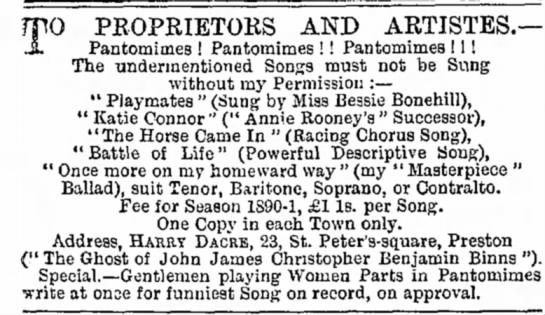| AKA | When I took my Nance to church |
| First Published | 1878 |
| Writer/composer | WH Phillips | Roud | RN5271 |
| Music Hall Performers | Fred Coyne |
| Folk performances | Collected from the singing of: Bennett, Sam; England : Warwickshire; 1929-35 Tyrrell, Mr.; England; 1942 Turner, Jim; England : Gloucestershire 1962 Russell, Dave; England : Gloucestershire; 1979 |
[From Beadle's half-dime singer's library; no. 11] When I Took Our Nance to Church! Published by E. H. Harding, 229 Bowery, N.Y. Music and words, 10 cents. I'm a jolly squire well known down here, and I hail from Devonshire, And a happy life with Nance my wife, I live from year to year; And as we sit by the fireside and children round us play, It makes me think of days gone by, and about our wedding day. The bulls did dance, the cows did prance, the pigs all grunted in the sty, The dogs did bark, the pretty little lark sung merrily in the sky; The cocks did crow to let folks know, the hens all cackl'd on the perch, And the ducks and drake such a row did make. when I took our Nance to church. Nance was a farmer's daughter, we met, 'twas on the green She was dancing round the May-pole and call'd the Village Queen; She consented I might see her home, as I took her pretty arm, And made love to her all the way until I reach'd the farm. I remember one fine moonlight night as we stood by the old farm gate, I kiss'd our Nance's rosy cheek and said, "I'll know my fate;" I met the farmer going home and told him what I meant, He said, " Well, squire, with all my heart, to your marriage I'll consent." The pretty birds did gayly sing, 'twas on a summer's day, And the wedding-bells did merrily ring as to church we both did stray, The lads and lasses round the church they quickly did advance, And wished long life and happiness to me and to our Nance.
A song written by Manchester-born songwriter WH Phillips, a hit for Fred Coyne in the late 1870s. It has been collected from several English traditional singers in the 20th century.
It was a popular song for amateur singers in the late 19th century and there are multiple reports in newspapers and memoirs of it being sung at smoking concerts and the like. It does not appear to have been widely pirated in cheap street literature on this side of the Atlantic and I can’t find any instances of it in any British broadsheets, though it was published in America in Beadle’s Half-Dime Singers Library.
A modern performance by the wonderful Gwilym Davies, originator of the excellent Glostrad site
Sources:
- Entries in the Roud Indexes at the Vaughn Williams Memorial Library: https://archives.vwml.org/search/all:single[folksong-broadside-books]/0_50/all/score_desc/extended-roudNo_tr%3A5271
- Kilgarrif Sing Us
- Lyrics: Nickels and dimes
- Sheet Music: held at British Library (not accessed)











